Nursing Intervention: Patient Care, Ethical and Legal Analysis
VerifiedAdded on 2022/10/04
|7
|2042
|248
Report
AI Summary
This report analyzes a nursing intervention case study involving a 27-year-old female patient, Shelley, admitted to a busy medical ward with left lower lobe pneumonia and an acquired brain injury (ABI). The report focuses on the ethical and legal complexities arising from Shelley's tendency to wander and abscond, along with her anxiety due to her mother's absence. The student nurse reflects on the importance of establishing therapeutic relationships, providing person-centered care, and addressing ethical dilemmas such as informed consent and patient autonomy. The report explores various nursing interventions to prevent absconding behavior, manage aggression, and ensure patient safety while adhering to ethical principles like beneficence and non-maleficence. The discussion includes strategies for communication, multidisciplinary approaches, and the significance of family-centered care. The report also highlights the importance of assessing the patient's mental state, administering medications appropriately, and addressing potential violations of ethical and legal perspectives. The student nurse reflects on the actions taken and considers alternative interventions to provide the best possible care for the patient.
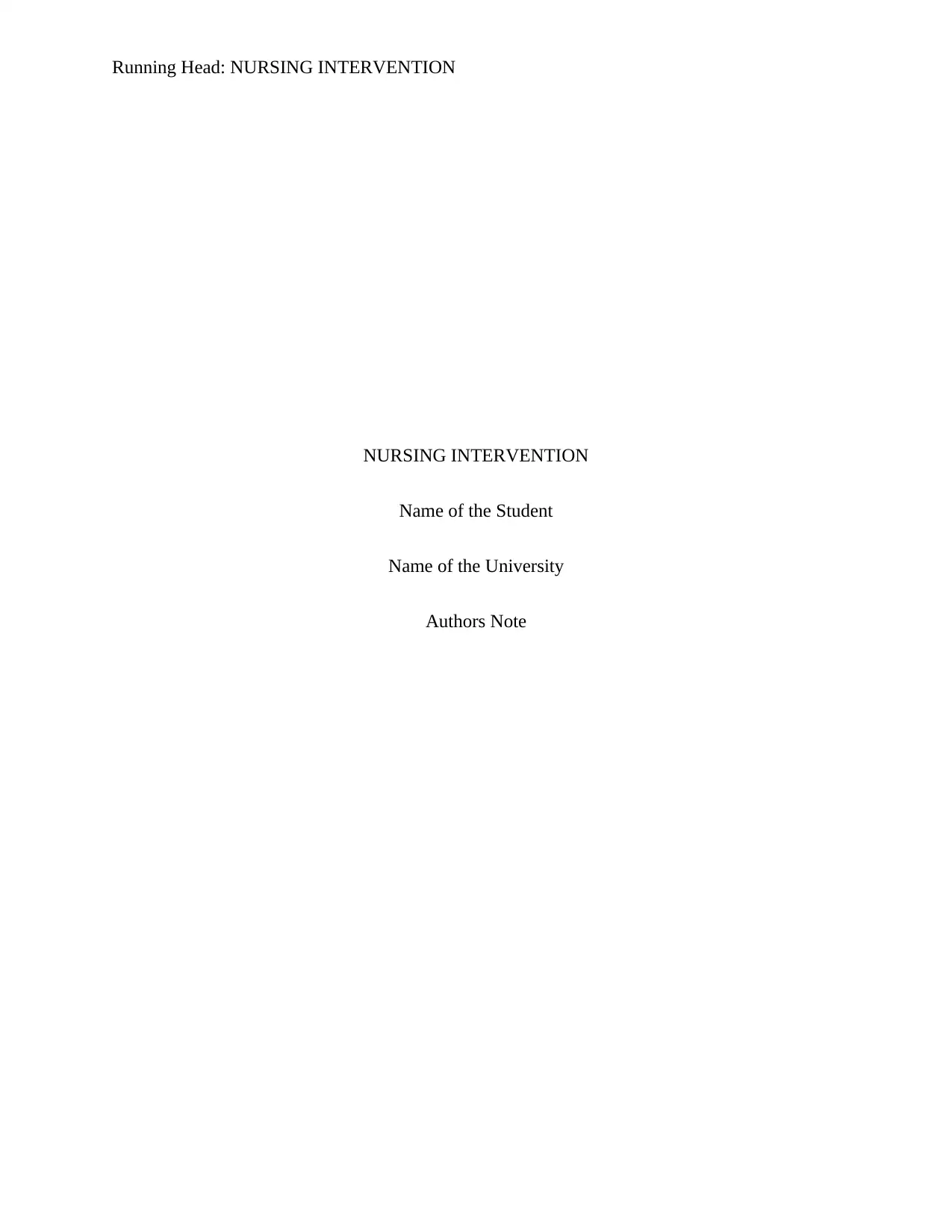
Running Head: NURSING INTERVENTION
NURSING INTERVENTION
Name of the Student
Name of the University
Authors Note
NURSING INTERVENTION
Name of the Student
Name of the University
Authors Note
Paraphrase This Document
Need a fresh take? Get an instant paraphrase of this document with our AI Paraphraser
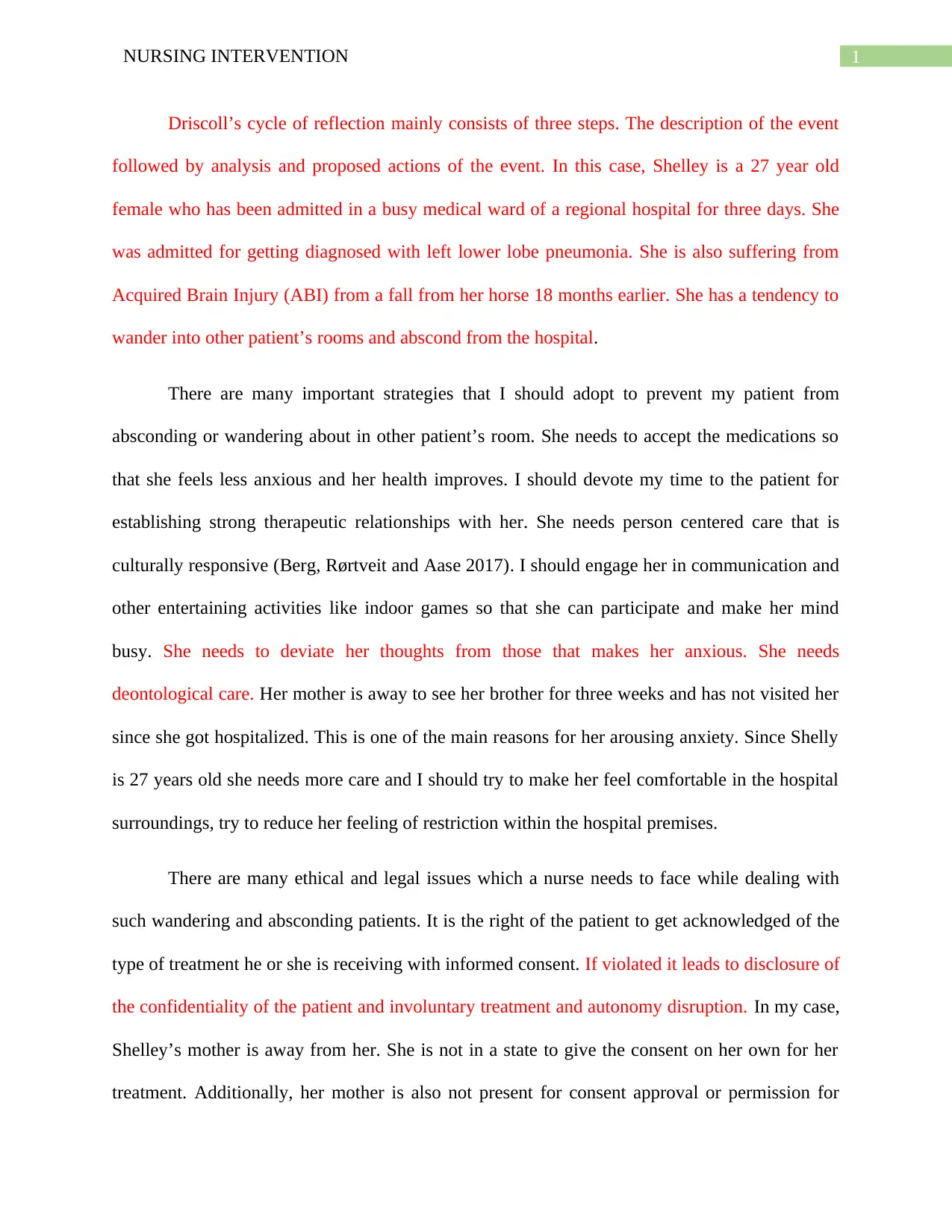
1NURSING INTERVENTION
Driscoll’s cycle of reflection mainly consists of three steps. The description of the event
followed by analysis and proposed actions of the event. In this case, Shelley is a 27 year old
female who has been admitted in a busy medical ward of a regional hospital for three days. She
was admitted for getting diagnosed with left lower lobe pneumonia. She is also suffering from
Acquired Brain Injury (ABI) from a fall from her horse 18 months earlier. She has a tendency to
wander into other patient’s rooms and abscond from the hospital.
There are many important strategies that I should adopt to prevent my patient from
absconding or wandering about in other patient’s room. She needs to accept the medications so
that she feels less anxious and her health improves. I should devote my time to the patient for
establishing strong therapeutic relationships with her. She needs person centered care that is
culturally responsive (Berg, Rørtveit and Aase 2017). I should engage her in communication and
other entertaining activities like indoor games so that she can participate and make her mind
busy. She needs to deviate her thoughts from those that makes her anxious. She needs
deontological care. Her mother is away to see her brother for three weeks and has not visited her
since she got hospitalized. This is one of the main reasons for her arousing anxiety. Since Shelly
is 27 years old she needs more care and I should try to make her feel comfortable in the hospital
surroundings, try to reduce her feeling of restriction within the hospital premises.
There are many ethical and legal issues which a nurse needs to face while dealing with
such wandering and absconding patients. It is the right of the patient to get acknowledged of the
type of treatment he or she is receiving with informed consent. If violated it leads to disclosure of
the confidentiality of the patient and involuntary treatment and autonomy disruption. In my case,
Shelley’s mother is away from her. She is not in a state to give the consent on her own for her
treatment. Additionally, her mother is also not present for consent approval or permission for
Driscoll’s cycle of reflection mainly consists of three steps. The description of the event
followed by analysis and proposed actions of the event. In this case, Shelley is a 27 year old
female who has been admitted in a busy medical ward of a regional hospital for three days. She
was admitted for getting diagnosed with left lower lobe pneumonia. She is also suffering from
Acquired Brain Injury (ABI) from a fall from her horse 18 months earlier. She has a tendency to
wander into other patient’s rooms and abscond from the hospital.
There are many important strategies that I should adopt to prevent my patient from
absconding or wandering about in other patient’s room. She needs to accept the medications so
that she feels less anxious and her health improves. I should devote my time to the patient for
establishing strong therapeutic relationships with her. She needs person centered care that is
culturally responsive (Berg, Rørtveit and Aase 2017). I should engage her in communication and
other entertaining activities like indoor games so that she can participate and make her mind
busy. She needs to deviate her thoughts from those that makes her anxious. She needs
deontological care. Her mother is away to see her brother for three weeks and has not visited her
since she got hospitalized. This is one of the main reasons for her arousing anxiety. Since Shelly
is 27 years old she needs more care and I should try to make her feel comfortable in the hospital
surroundings, try to reduce her feeling of restriction within the hospital premises.
There are many ethical and legal issues which a nurse needs to face while dealing with
such wandering and absconding patients. It is the right of the patient to get acknowledged of the
type of treatment he or she is receiving with informed consent. If violated it leads to disclosure of
the confidentiality of the patient and involuntary treatment and autonomy disruption. In my case,
Shelley’s mother is away from her. She is not in a state to give the consent on her own for her
treatment. Additionally, her mother is also not present for consent approval or permission for
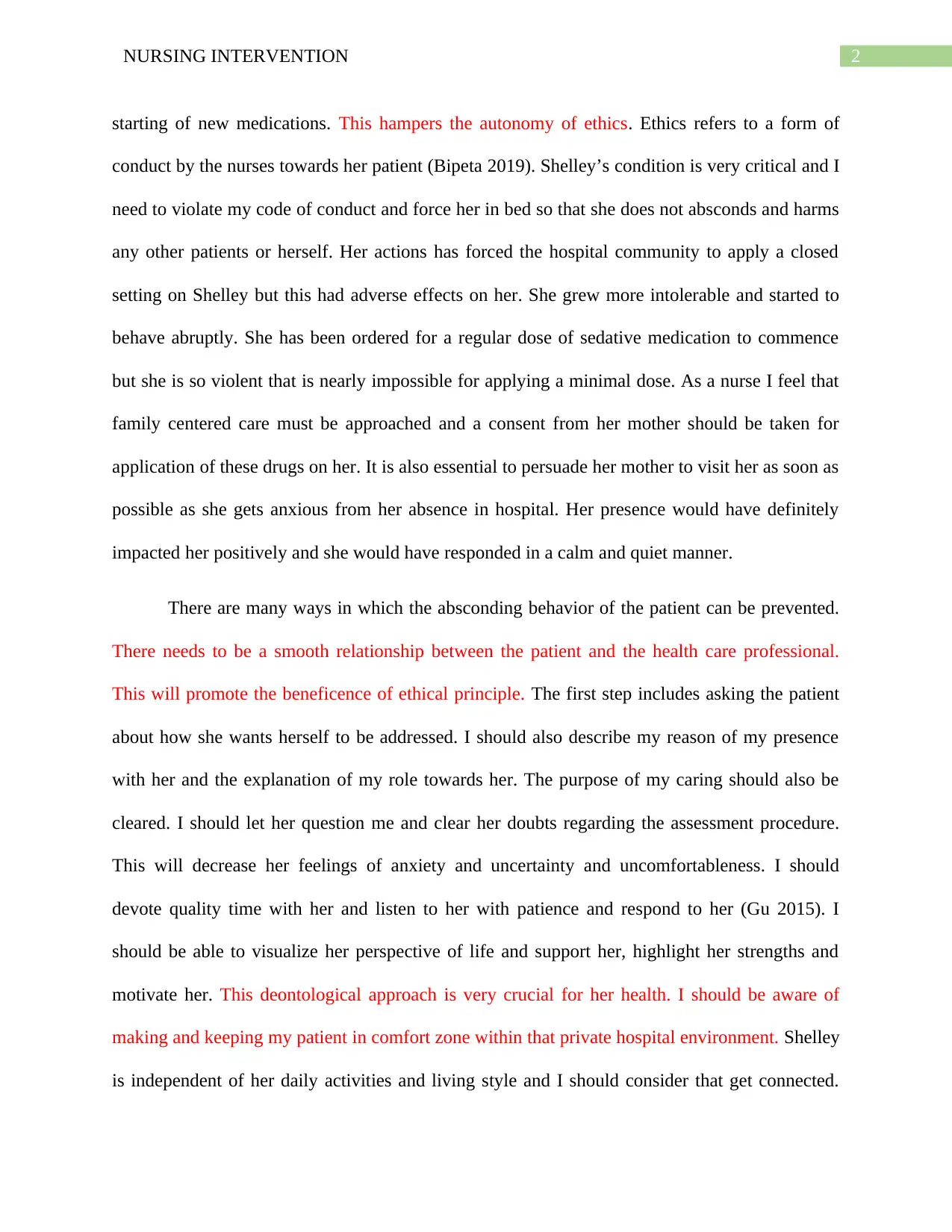
2NURSING INTERVENTION
starting of new medications. This hampers the autonomy of ethics. Ethics refers to a form of
conduct by the nurses towards her patient (Bipeta 2019). Shelley’s condition is very critical and I
need to violate my code of conduct and force her in bed so that she does not absconds and harms
any other patients or herself. Her actions has forced the hospital community to apply a closed
setting on Shelley but this had adverse effects on her. She grew more intolerable and started to
behave abruptly. She has been ordered for a regular dose of sedative medication to commence
but she is so violent that is nearly impossible for applying a minimal dose. As a nurse I feel that
family centered care must be approached and a consent from her mother should be taken for
application of these drugs on her. It is also essential to persuade her mother to visit her as soon as
possible as she gets anxious from her absence in hospital. Her presence would have definitely
impacted her positively and she would have responded in a calm and quiet manner.
There are many ways in which the absconding behavior of the patient can be prevented.
There needs to be a smooth relationship between the patient and the health care professional.
This will promote the beneficence of ethical principle. The first step includes asking the patient
about how she wants herself to be addressed. I should also describe my reason of my presence
with her and the explanation of my role towards her. The purpose of my caring should also be
cleared. I should let her question me and clear her doubts regarding the assessment procedure.
This will decrease her feelings of anxiety and uncertainty and uncomfortableness. I should
devote quality time with her and listen to her with patience and respond to her (Gu 2015). I
should be able to visualize her perspective of life and support her, highlight her strengths and
motivate her. This deontological approach is very crucial for her health. I should be aware of
making and keeping my patient in comfort zone within that private hospital environment. Shelley
is independent of her daily activities and living style and I should consider that get connected.
starting of new medications. This hampers the autonomy of ethics. Ethics refers to a form of
conduct by the nurses towards her patient (Bipeta 2019). Shelley’s condition is very critical and I
need to violate my code of conduct and force her in bed so that she does not absconds and harms
any other patients or herself. Her actions has forced the hospital community to apply a closed
setting on Shelley but this had adverse effects on her. She grew more intolerable and started to
behave abruptly. She has been ordered for a regular dose of sedative medication to commence
but she is so violent that is nearly impossible for applying a minimal dose. As a nurse I feel that
family centered care must be approached and a consent from her mother should be taken for
application of these drugs on her. It is also essential to persuade her mother to visit her as soon as
possible as she gets anxious from her absence in hospital. Her presence would have definitely
impacted her positively and she would have responded in a calm and quiet manner.
There are many ways in which the absconding behavior of the patient can be prevented.
There needs to be a smooth relationship between the patient and the health care professional.
This will promote the beneficence of ethical principle. The first step includes asking the patient
about how she wants herself to be addressed. I should also describe my reason of my presence
with her and the explanation of my role towards her. The purpose of my caring should also be
cleared. I should let her question me and clear her doubts regarding the assessment procedure.
This will decrease her feelings of anxiety and uncertainty and uncomfortableness. I should
devote quality time with her and listen to her with patience and respond to her (Gu 2015). I
should be able to visualize her perspective of life and support her, highlight her strengths and
motivate her. This deontological approach is very crucial for her health. I should be aware of
making and keeping my patient in comfort zone within that private hospital environment. Shelley
is independent of her daily activities and living style and I should consider that get connected.
⊘ This is a preview!⊘
Do you want full access?
Subscribe today to unlock all pages.

Trusted by 1+ million students worldwide
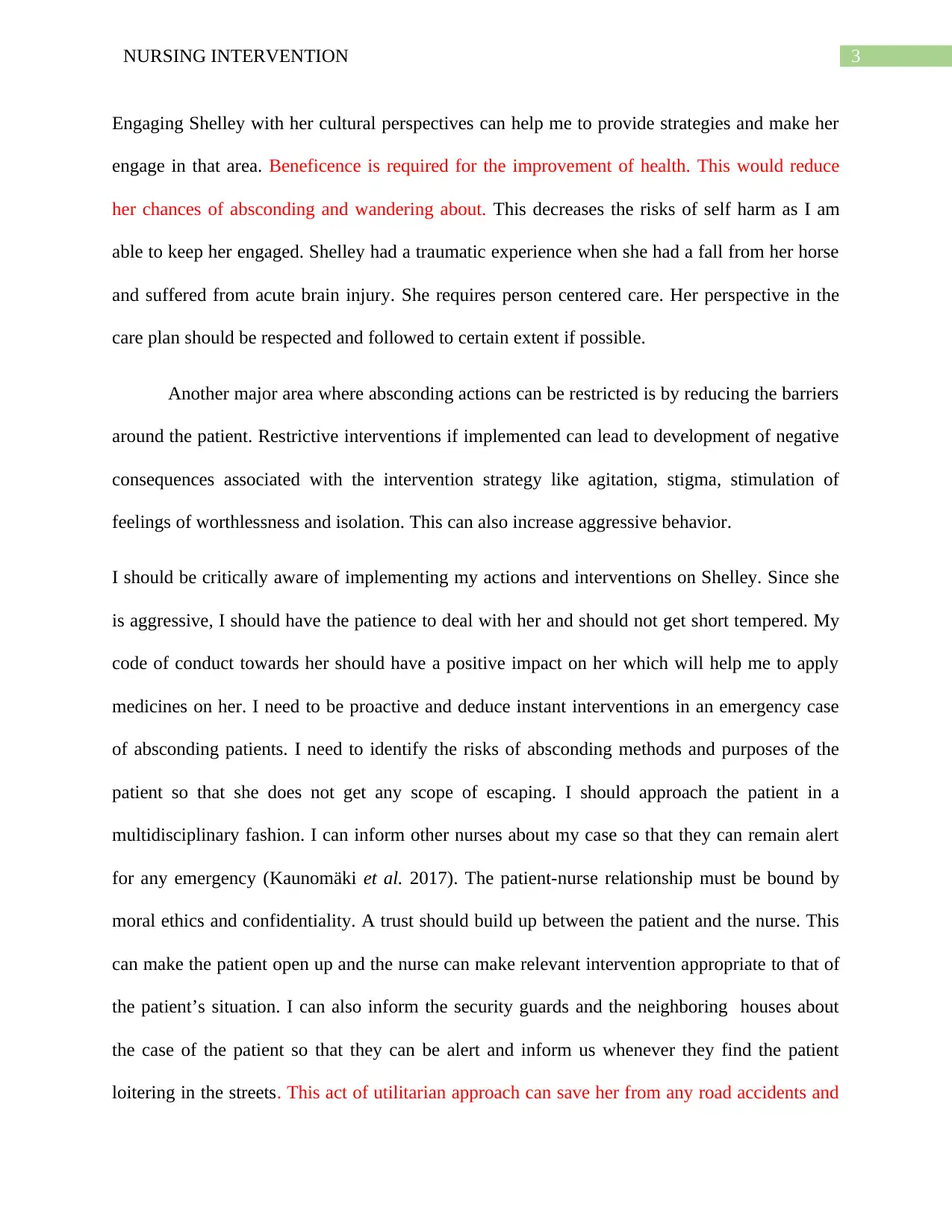
3NURSING INTERVENTION
Engaging Shelley with her cultural perspectives can help me to provide strategies and make her
engage in that area. Beneficence is required for the improvement of health. This would reduce
her chances of absconding and wandering about. This decreases the risks of self harm as I am
able to keep her engaged. Shelley had a traumatic experience when she had a fall from her horse
and suffered from acute brain injury. She requires person centered care. Her perspective in the
care plan should be respected and followed to certain extent if possible.
Another major area where absconding actions can be restricted is by reducing the barriers
around the patient. Restrictive interventions if implemented can lead to development of negative
consequences associated with the intervention strategy like agitation, stigma, stimulation of
feelings of worthlessness and isolation. This can also increase aggressive behavior.
I should be critically aware of implementing my actions and interventions on Shelley. Since she
is aggressive, I should have the patience to deal with her and should not get short tempered. My
code of conduct towards her should have a positive impact on her which will help me to apply
medicines on her. I need to be proactive and deduce instant interventions in an emergency case
of absconding patients. I need to identify the risks of absconding methods and purposes of the
patient so that she does not get any scope of escaping. I should approach the patient in a
multidisciplinary fashion. I can inform other nurses about my case so that they can remain alert
for any emergency (Kaunomäki et al. 2017). The patient-nurse relationship must be bound by
moral ethics and confidentiality. A trust should build up between the patient and the nurse. This
can make the patient open up and the nurse can make relevant intervention appropriate to that of
the patient’s situation. I can also inform the security guards and the neighboring houses about
the case of the patient so that they can be alert and inform us whenever they find the patient
loitering in the streets. This act of utilitarian approach can save her from any road accidents and
Engaging Shelley with her cultural perspectives can help me to provide strategies and make her
engage in that area. Beneficence is required for the improvement of health. This would reduce
her chances of absconding and wandering about. This decreases the risks of self harm as I am
able to keep her engaged. Shelley had a traumatic experience when she had a fall from her horse
and suffered from acute brain injury. She requires person centered care. Her perspective in the
care plan should be respected and followed to certain extent if possible.
Another major area where absconding actions can be restricted is by reducing the barriers
around the patient. Restrictive interventions if implemented can lead to development of negative
consequences associated with the intervention strategy like agitation, stigma, stimulation of
feelings of worthlessness and isolation. This can also increase aggressive behavior.
I should be critically aware of implementing my actions and interventions on Shelley. Since she
is aggressive, I should have the patience to deal with her and should not get short tempered. My
code of conduct towards her should have a positive impact on her which will help me to apply
medicines on her. I need to be proactive and deduce instant interventions in an emergency case
of absconding patients. I need to identify the risks of absconding methods and purposes of the
patient so that she does not get any scope of escaping. I should approach the patient in a
multidisciplinary fashion. I can inform other nurses about my case so that they can remain alert
for any emergency (Kaunomäki et al. 2017). The patient-nurse relationship must be bound by
moral ethics and confidentiality. A trust should build up between the patient and the nurse. This
can make the patient open up and the nurse can make relevant intervention appropriate to that of
the patient’s situation. I can also inform the security guards and the neighboring houses about
the case of the patient so that they can be alert and inform us whenever they find the patient
loitering in the streets. This act of utilitarian approach can save her from any road accidents and
Paraphrase This Document
Need a fresh take? Get an instant paraphrase of this document with our AI Paraphraser
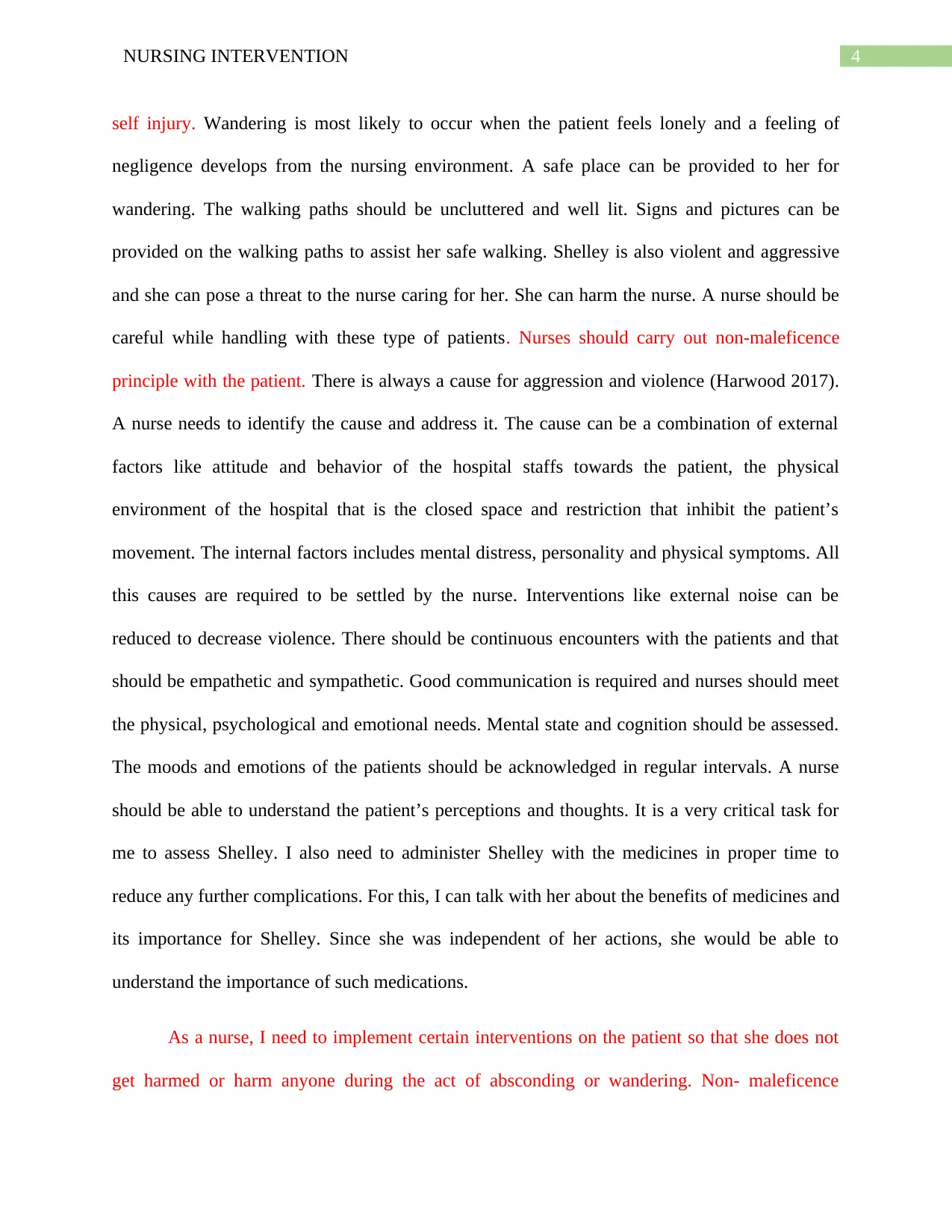
4NURSING INTERVENTION
self injury. Wandering is most likely to occur when the patient feels lonely and a feeling of
negligence develops from the nursing environment. A safe place can be provided to her for
wandering. The walking paths should be uncluttered and well lit. Signs and pictures can be
provided on the walking paths to assist her safe walking. Shelley is also violent and aggressive
and she can pose a threat to the nurse caring for her. She can harm the nurse. A nurse should be
careful while handling with these type of patients. Nurses should carry out non-maleficence
principle with the patient. There is always a cause for aggression and violence (Harwood 2017).
A nurse needs to identify the cause and address it. The cause can be a combination of external
factors like attitude and behavior of the hospital staffs towards the patient, the physical
environment of the hospital that is the closed space and restriction that inhibit the patient’s
movement. The internal factors includes mental distress, personality and physical symptoms. All
this causes are required to be settled by the nurse. Interventions like external noise can be
reduced to decrease violence. There should be continuous encounters with the patients and that
should be empathetic and sympathetic. Good communication is required and nurses should meet
the physical, psychological and emotional needs. Mental state and cognition should be assessed.
The moods and emotions of the patients should be acknowledged in regular intervals. A nurse
should be able to understand the patient’s perceptions and thoughts. It is a very critical task for
me to assess Shelley. I also need to administer Shelley with the medicines in proper time to
reduce any further complications. For this, I can talk with her about the benefits of medicines and
its importance for Shelley. Since she was independent of her actions, she would be able to
understand the importance of such medications.
As a nurse, I need to implement certain interventions on the patient so that she does not
get harmed or harm anyone during the act of absconding or wandering. Non- maleficence
self injury. Wandering is most likely to occur when the patient feels lonely and a feeling of
negligence develops from the nursing environment. A safe place can be provided to her for
wandering. The walking paths should be uncluttered and well lit. Signs and pictures can be
provided on the walking paths to assist her safe walking. Shelley is also violent and aggressive
and she can pose a threat to the nurse caring for her. She can harm the nurse. A nurse should be
careful while handling with these type of patients. Nurses should carry out non-maleficence
principle with the patient. There is always a cause for aggression and violence (Harwood 2017).
A nurse needs to identify the cause and address it. The cause can be a combination of external
factors like attitude and behavior of the hospital staffs towards the patient, the physical
environment of the hospital that is the closed space and restriction that inhibit the patient’s
movement. The internal factors includes mental distress, personality and physical symptoms. All
this causes are required to be settled by the nurse. Interventions like external noise can be
reduced to decrease violence. There should be continuous encounters with the patients and that
should be empathetic and sympathetic. Good communication is required and nurses should meet
the physical, psychological and emotional needs. Mental state and cognition should be assessed.
The moods and emotions of the patients should be acknowledged in regular intervals. A nurse
should be able to understand the patient’s perceptions and thoughts. It is a very critical task for
me to assess Shelley. I also need to administer Shelley with the medicines in proper time to
reduce any further complications. For this, I can talk with her about the benefits of medicines and
its importance for Shelley. Since she was independent of her actions, she would be able to
understand the importance of such medications.
As a nurse, I need to implement certain interventions on the patient so that she does not
get harmed or harm anyone during the act of absconding or wandering. Non- maleficence
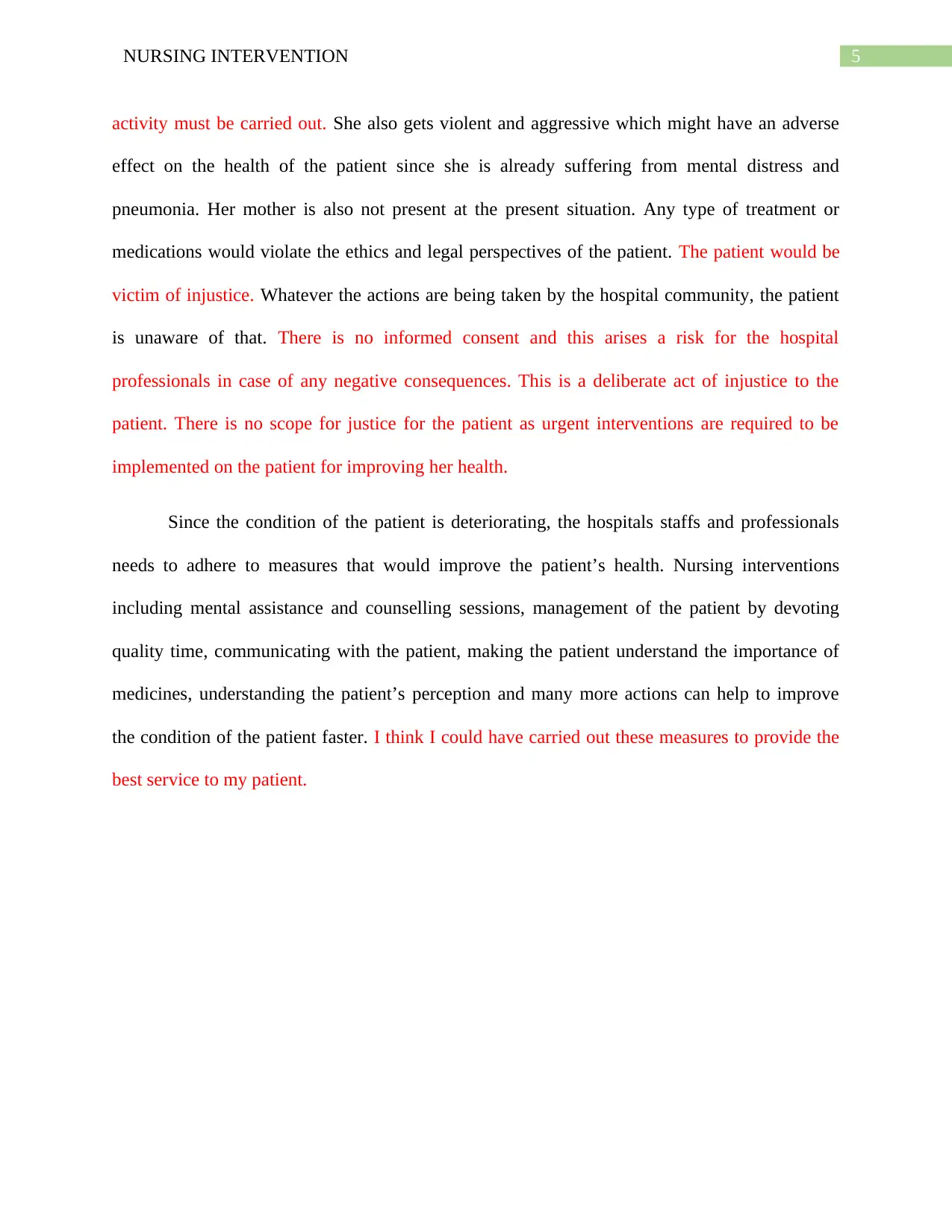
5NURSING INTERVENTION
activity must be carried out. She also gets violent and aggressive which might have an adverse
effect on the health of the patient since she is already suffering from mental distress and
pneumonia. Her mother is also not present at the present situation. Any type of treatment or
medications would violate the ethics and legal perspectives of the patient. The patient would be
victim of injustice. Whatever the actions are being taken by the hospital community, the patient
is unaware of that. There is no informed consent and this arises a risk for the hospital
professionals in case of any negative consequences. This is a deliberate act of injustice to the
patient. There is no scope for justice for the patient as urgent interventions are required to be
implemented on the patient for improving her health.
Since the condition of the patient is deteriorating, the hospitals staffs and professionals
needs to adhere to measures that would improve the patient’s health. Nursing interventions
including mental assistance and counselling sessions, management of the patient by devoting
quality time, communicating with the patient, making the patient understand the importance of
medicines, understanding the patient’s perception and many more actions can help to improve
the condition of the patient faster. I think I could have carried out these measures to provide the
best service to my patient.
activity must be carried out. She also gets violent and aggressive which might have an adverse
effect on the health of the patient since she is already suffering from mental distress and
pneumonia. Her mother is also not present at the present situation. Any type of treatment or
medications would violate the ethics and legal perspectives of the patient. The patient would be
victim of injustice. Whatever the actions are being taken by the hospital community, the patient
is unaware of that. There is no informed consent and this arises a risk for the hospital
professionals in case of any negative consequences. This is a deliberate act of injustice to the
patient. There is no scope for justice for the patient as urgent interventions are required to be
implemented on the patient for improving her health.
Since the condition of the patient is deteriorating, the hospitals staffs and professionals
needs to adhere to measures that would improve the patient’s health. Nursing interventions
including mental assistance and counselling sessions, management of the patient by devoting
quality time, communicating with the patient, making the patient understand the importance of
medicines, understanding the patient’s perception and many more actions can help to improve
the condition of the patient faster. I think I could have carried out these measures to provide the
best service to my patient.
⊘ This is a preview!⊘
Do you want full access?
Subscribe today to unlock all pages.

Trusted by 1+ million students worldwide
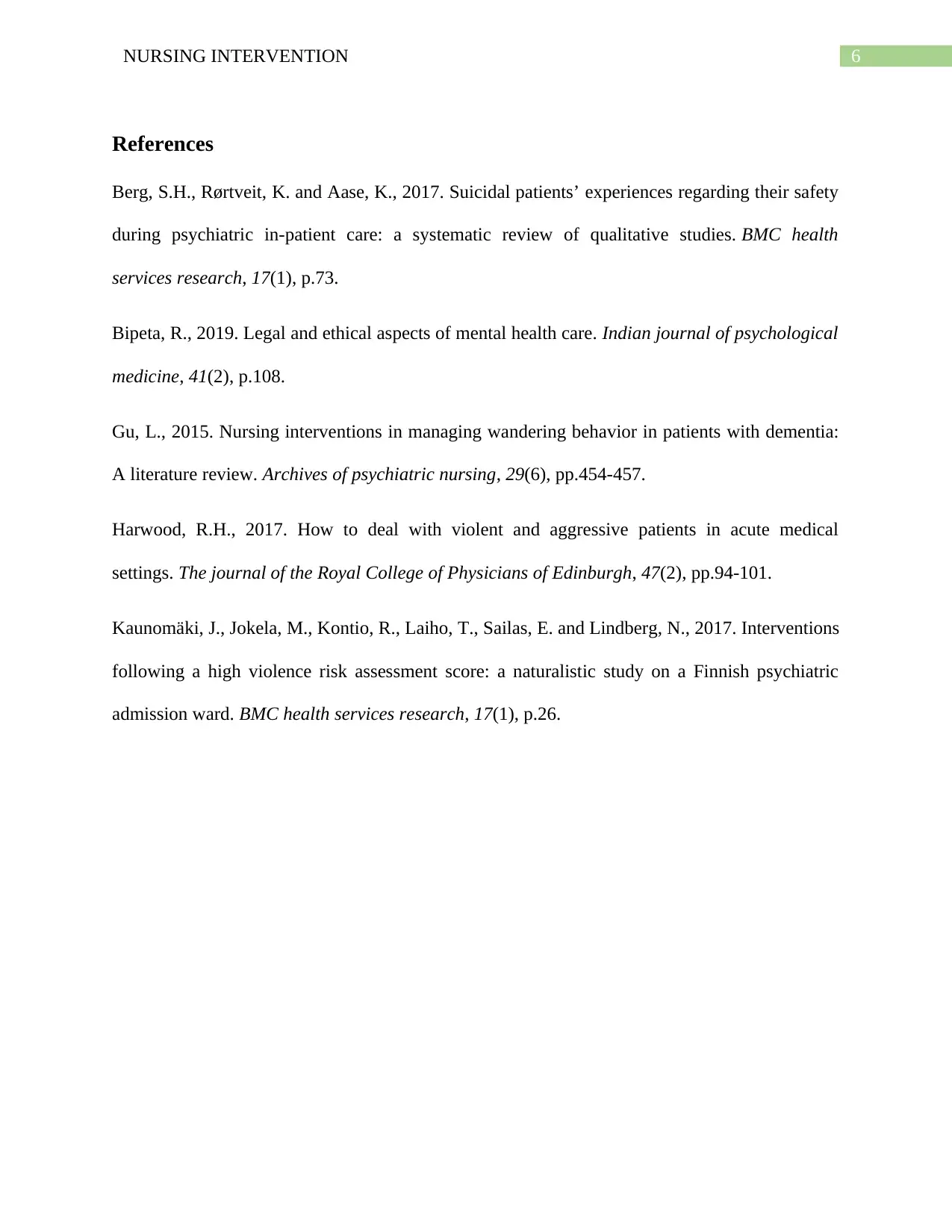
6NURSING INTERVENTION
References
Berg, S.H., Rørtveit, K. and Aase, K., 2017. Suicidal patients’ experiences regarding their safety
during psychiatric in-patient care: a systematic review of qualitative studies. BMC health
services research, 17(1), p.73.
Bipeta, R., 2019. Legal and ethical aspects of mental health care. Indian journal of psychological
medicine, 41(2), p.108.
Gu, L., 2015. Nursing interventions in managing wandering behavior in patients with dementia:
A literature review. Archives of psychiatric nursing, 29(6), pp.454-457.
Harwood, R.H., 2017. How to deal with violent and aggressive patients in acute medical
settings. The journal of the Royal College of Physicians of Edinburgh, 47(2), pp.94-101.
Kaunomäki, J., Jokela, M., Kontio, R., Laiho, T., Sailas, E. and Lindberg, N., 2017. Interventions
following a high violence risk assessment score: a naturalistic study on a Finnish psychiatric
admission ward. BMC health services research, 17(1), p.26.
References
Berg, S.H., Rørtveit, K. and Aase, K., 2017. Suicidal patients’ experiences regarding their safety
during psychiatric in-patient care: a systematic review of qualitative studies. BMC health
services research, 17(1), p.73.
Bipeta, R., 2019. Legal and ethical aspects of mental health care. Indian journal of psychological
medicine, 41(2), p.108.
Gu, L., 2015. Nursing interventions in managing wandering behavior in patients with dementia:
A literature review. Archives of psychiatric nursing, 29(6), pp.454-457.
Harwood, R.H., 2017. How to deal with violent and aggressive patients in acute medical
settings. The journal of the Royal College of Physicians of Edinburgh, 47(2), pp.94-101.
Kaunomäki, J., Jokela, M., Kontio, R., Laiho, T., Sailas, E. and Lindberg, N., 2017. Interventions
following a high violence risk assessment score: a naturalistic study on a Finnish psychiatric
admission ward. BMC health services research, 17(1), p.26.
1 out of 7
Related Documents
Your All-in-One AI-Powered Toolkit for Academic Success.
+13062052269
info@desklib.com
Available 24*7 on WhatsApp / Email
![[object Object]](/_next/static/media/star-bottom.7253800d.svg)
Unlock your academic potential
Copyright © 2020–2025 A2Z Services. All Rights Reserved. Developed and managed by ZUCOL.





